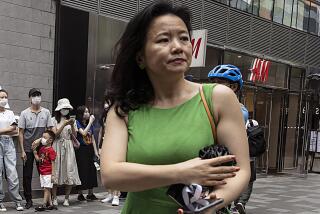China Expels Reporter for French Wire Service
- Share via
PEKING — China expelled a reporter for the French news agency Monday after making unspecified complaints about his conduct during his coverage of recent protest demonstrations by Chinese students.
Lawrence MacDonald, 32, a reporter for Agence France-Presse and a U.S. citizen from San Luis Obispo, Calif., was the first journalist to cover the series of student demonstrations that began last month in the city of Hefei. He was the second foreign correspondent to be expelled by China in the last six months and the third since 1984.
Meanwhile, a Communist Party newspaper launched the strongest challenge in years to foreign investment from the West, arguing that “we must rely on our own efforts.”
“With 1 billion people, how can we rely on the favors and charity bestowed by other countries to build a socialist country with Chinese characteristics?” the Workers’ Daily said in a front-page commentary.
‘Capitalists Are Capitalists’
“Even if all the capitalists joined together to help us, it would not be possible for them to succeed. Besides, capitalists are capitalists. They will never be so generous as to assist a country like ours without benefiting themselves.”
China will continue to bring in foreign technology and funds, the paper said, but it will stick to a policy of “self-reliance.”
The Chinese action against MacDonald was announced by the official New China News Agency, which said the government had “required Agence France-Presse to transfer (MacDonald) . . . out of China.”
The Chinese account said that the Ministry of State Security had “obtained conclusive evidence of MacDonald’s recent activities, which did not accord with his status as a journalist and were harmful to friendship between the Chinese and French people.”
On Sunday, security officials said they had arrested a university student named Lin Jie for providing “intelligence” to MacDonald. Monday’s statement by the New China News Agency said nothing about intelligence.
Monday’s Discussions
According to Agence France-Presse, the Chinese order followed discussions Monday in which the Chinese Foreign Ministry asked the news agency to transfer MacDonald. After agency officials declined, saying it was not their policy to recall a correspondent whose work was fully satisfactory, a Chinese spokesman said MacDonald would not be permitted to remain.
The French agency said the chief of its Peking bureau, Bernard Degioanni, was told that the activities by MacDonald to which China objected occurred “during protests by a small number of Chinese students.”
The news agency said that despite several requests, the Chinese spokesman, Zeng Wenbin, refused to give any details of the allegations against MacDonald.
The Chinese spokesman said that MacDonald, who was on vacation in Hong Kong, will be allowed to return to Peking only to pack his belongings and “in no circumstances to discuss the matter with Chinese authorities.”
In Hong Kong, MacDonald termed the Chinese charges against him “totally absurd” and added: “During my two years in China, I have never sought or received any information other than that directly related to my job as correspondent for AFP. My actions have at all times been in accord with accepted practices of journalism.”
Third Expulsion
MacDonald’s ouster marks the third time in less than three years that China has expelled a journalist. In each instance, the journalist was a citizen of one nation working for a news organization of another country, making it difficult for a single government to contest the action.
In 1984, China expelled Tiziano Terzani, an Italian who had written critically about the Communist regime here for the German magazine Der Spiegel. The Chinese asserted that Terzani had been smuggling antiquities.
Last July, John F. Burns, a British citizen working for the New York Times, was detained for six days and then expelled after he made an unauthorized motorcycle trip through an area closed to foreigners.
In 1981, at a time of strained relations between China and the Netherlands, China expelled a Dutch reporter on grounds that his wife, a Chinese from Taiwan, was gathering intelligence.
And in 1977, China refused a request to extend the work permit of a Canadian reporter who had written a series of articles critical of the regime’s human rights policies.
Speaks Fluent Chinese
MacDonald, a graduate of UC Santa Barbara, has been one of four reporters for AFP in Peking since 1985, reporting for the agency’s English-language service. MacDonald’s grandparents worked in China, and his mother was born here. He was among the most fluent Chinese-speakers in Peking’s foreign press corps.
The Workers’ Daily commentary calling for an economic policy of self-reliance was entitled “We’d Rather Sweat Than Let the Country Have More Problems.” It urged China’s urban work force of 120 million people to follow the selfless image and discipline of the People’s Liberation Army.
Over the last few years, the Workers Daily has generally reflected the view of conservative elements within the Communist Party leadership.
More to Read
Sign up for Essential California
The most important California stories and recommendations in your inbox every morning.
You may occasionally receive promotional content from the Los Angeles Times.













